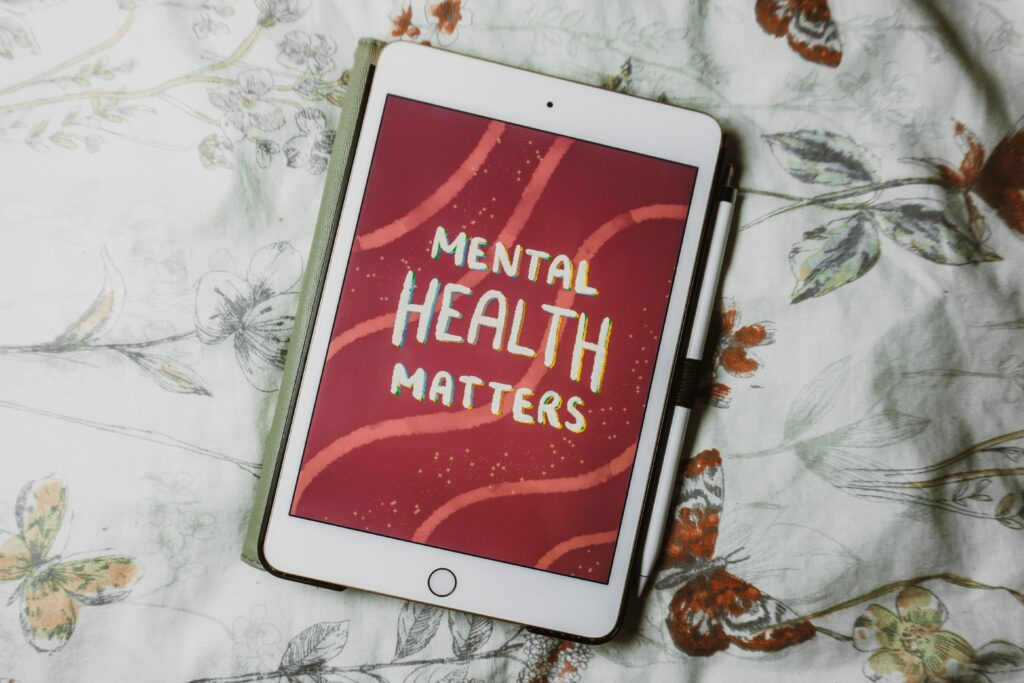
Mental Health: Best 5 Tips for Maintaining Student Wellbeing

As a student mental health can often be an afterthought, it can be easy to get caught up in the overwhelming demands of academics, extracurricular activities, and social obligations. While it’s important to challenge yourself and strive for success, it’s equally important to prioritize your mental health. Let’s normalise talking about Mental Health, remove the stigma and care for one another. You never know what someone is going through and often the loudest are the ones most in need of some support!
Here are five tips to help you take care of your mind while you’re tackling your studies:
1. Set boundaries
It’s easy to fall into the trap of constantly working and feeling like you should be doing more. But it’s crucial to take breaks and set boundaries for yourself. This could mean setting limits on the number of hours you spend studying each day, taking time to unplug from your devices, or setting aside time for leisure activities or self-care.
In this social and highly technological day and age it is often very important to set digital boundaries as well as physical boundaries. Digital Boundary-setting tools can be used set boundaries around your work and personal time can be crucial for maintaining a healthy balance. This could mean setting limits on the hours you work each day, turning off notifications outside of work hours, or setting aside dedicated time for leisure and self-care.
Try setting a ‘do not disturb’ mode on your phone between certain hours. While working use dedicated apps like: “Forest” app, this app helps you stay focused on the important things in life. Whenever you want to stay focused, plant a tree. Your tree will grow while you focus on your work. If you leave the app halfway, your tree to die meaning you will have to plant another tree and lose your progress.
2. Seek support
Whether you’re struggling with a specific problem or just feeling overwhelmed, it’s important to have a support system in place. This could be a trusted friend or family member, a counsellor or therapist, or a student support centre on campus. Don’t be afraid to reach out for help when you need it.
There are a few key reasons why seeking support is so important:
- You don’t have to go through it alone: It can be tempting to try and tough it out on your own, especially if you’re used to being independent. But no one is meant to go through difficult times alone, humans are social creatures. Talking to someone about what you’re going through can be incredibly helpful and can provide a sense of relief and support.
- It can help you find solutions: Sometimes it can be hard to see a way out of a difficult situation on your own. Talking to someone about your struggles can help you gain perspective and find solutions that you might not have been able to see on your own.
- It can improve your mental health: By seeking support and talking to someone about your struggles, you can improve your mental health. You might find that your mood improves and that you feel more able to cope with the challenges you’re facing.
… as we said above, sometimes venting about the problem will help you gain some clarity whether it is a family member or a Uni friend. Leaning on them can really help relieve some of the internal stresses you’re going through. Often there is dedicated help in your University which most students are unaware of, during our primary research over 90% of students said they were unaware of the help available to them in their University.
At UniWOM, we are working on creating a segment within the UniWOM app where students can find all available support to them: within their Universities, their local area and nationwide support! If you would like some Student Money Tips check out a Blog we posted about that here…

3. Practice self-care
Self-care is more than just indulging in bubble baths and face masks (although those can be great too). It’s about taking the time to care for your physical and emotional well-being. Make sure to eat well, get enough sleep, and find ways to manage stress. Here are a few self-care tips that we recommend incorporating into your daily routines to help manage and maintain your mental well-being:
- Try meditation: a simple and effective way to reduce stress and promote relaxation. It helps to clear your mind of distractions, calm your body and quiet your racing thoughts.
- Exercise daily: Exercise is a natural stress-buster and can help reduce feelings of anxiety and depression. Physical activity releases endorphins and improves sleep (which is often disrupted by stress), it also increases your self-esteem and overall sense of well-being.
- Fresh Air: being outdoors in natural surroundings has been shown to reduce levels of the stress hormone cortisol and increase feelings of calm and relaxation.
- Cold Exposure: exposing yourself to cold temperatures can have a number of benefits for your physical and mental health, including reducing stress. (make sure you do this in a safe environment and be sensible with the length of time you do this for – here is a video we recommend on the subject by Dr Andrew Huberman who is a Stanford University, Neuroscientist)
- Journaling: a helpful way to process and manage stress. By writing down your thoughts and feelings, you can gain clarity and perspective on what’s causing you stress and find ways to better cope with it. Journaling can also be a therapeutic outlet for releasing emotions and can help you feel more in control of your life and your stress.
Try and Incorporate some of these into your daily routine, be patient and stick with them. These o help reduce stress and increase your overall well-being
4. Find balance
It’s important to find a balance between work and play. Don’t neglect your social life or hobbies just because you have a lot of assignments. Make time for the things that bring you joy and give you a break from the demands of school. When striving to find balance start here:
- Time management tools: There are a variety of time management tools available that can help you better plan your day and prioritize your tasks. For example, you might use a calendar app to schedule your appointments and to-do lists, or you might use a productivity app to help you focus on your work and avoid distractions.
- Communication tools: It’s important to have effective communication with your colleagues and manager in order to set clear expectations and boundaries around your work. Tools like Slack or Microsoft Teams can help you stay connected with your team while still maintaining a healthy work-life balance.
- Self-care tools: Taking care of yourself is an important part of maintaining a healthy work-life balance. Consider incorporating self-care practices like meditation, exercise, or journaling into your daily routine to help reduce stress and increase your overall well-being.
Remember, it’s important to find a balance that works for you and your specific needs and priorities. Don’t be afraid to try out different tools and techniques until you find what works best for you.
5. Seek professional help if needed
If you’re struggling with mental health or feel like you’re unable to cope, don’t hesitate to seek professional help. It’s completely normal to need extra support at times, and there is no shame in seeking the assistance of a trained mental health professional.
Remember, your mental health is just as important as your academic success. By taking care of yourself and seeking support when you need it, you’ll be better equipped to handle the challenges of student life and achieve your goals.
In conclusion:
If you’re struggling, having a bad day or have had one recently try and implement some of these tips into your daily routine. Let’s remove the stigma around the topic of Mental Health and make it a priority for Students and young people around the UK. Feeling overwhelmed and in a rut make sure to take a step back and go outdoors, get some fresh air, go to the GYM or speak with a friend.
Try deleting social media and detoxing from it. Social media evokes comparison and a wise man/lady once said comparison is the thief of joy. In concluding this article all I can say is to be kind to yourself and to others, prioritise yourself and your mental well-being and look after yourself!
Love from, UniWOM! <3